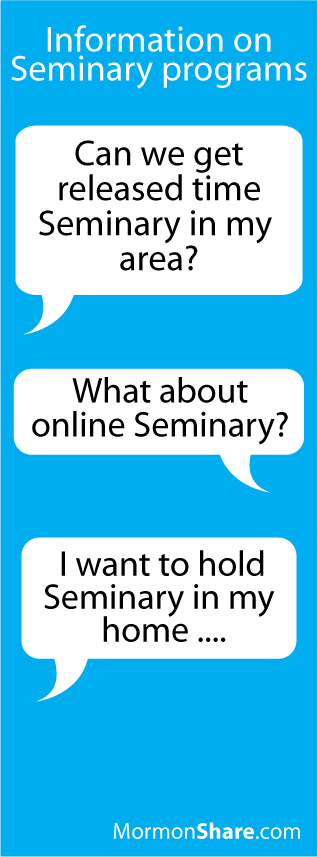Our unit has a number of challenges that make it very difficult to organize Seminary. Our boundaries have resulted in a unit that covers parts of the boundaries of three high schools. Additionally, one family of three Seminary-aged children attends a fourth high school. Two students are enrolled in college courses. Four or five more are home schooled. The building to which we are assigned is far outside our ward boundaries, some 35 minutes drive for me (some students travel 45 minutes), and it’s another 25-35 minutes back to get to the high schools we are zoned for. The three closer buildings are either too far from our high schools or are already filled to the brim with the Seminary classes in the units that are assigned to those buildings. A majority of households in our area commute to DC, which means parents leave the home anywhere between 4 and 6 AM. The result is many students must rely on others for transportation to Seminary and from Seminary to school. In our area, the graduated driver’s license program prohibits student drivers from transporting more than one non-family member in their vehicle at a time. Add on top of this the embarrassing state of the roads here (no shoulder, no lighting, no lines, virtually no snow removal), and it combines to make a difficult situation a dangerous one for new drivers.
Ours is the nightmare that keeps other logistical nightmares up at night.
I’ve spent the past years as a Seminary teacher coming up with different scenarios to solve various problems in our area. There is no solution that answers all of our problems, but I’ve learned a lot about the different options for Seminary programs that I’ll share below:
Released Time
Released time is an option where students leave campus to attend a religious course funded by parents or churches. Courses are generally taught by paid, professionally trained teachers employed by the Church Education System’s Seminary and Institutes program in a nearby purpose-built structure. In some areas students may receive at least some academic course credit for released time education. The right to released time education has been challenged in court several times, and the US Supreme Court has generally upheld it.
So, early morning Seminary is torture, and you want to start up a released time Seminary program. Join the club.
Truth is, you may be able to start a released time course with a good deal of legwork and some financial expenditure. Here are the basic rules:
- Classes must not be held on public school property.
- Religious instruction may not be financed by public funds.
- Students must have parental permission to be released from public school for the purpose of attending religious instruction.
These general rules have been held up by the US Supreme Court. In short, released time religious education accommodates religion without establishing it. States with existing programs include Utah, Idaho, Colorado, Arizona, Virginia, South Carolina, and New York. There are probably others (some articles report 32 states include them).
Considerations:
- In order for students to get academic credit for released time Seminary courses, the course should be of the same academic rigor as a regular academic or elective course. South Carolina allows academic credit for released time, but I don’t know about other states.
- The Church will have to provide a location, like a rented trailer on adjacent property, and a teacher. (If it were me, I’d propose joint-renting a trailer with several other denominations to establish their own similar courses, but I suspect this will be shot down by leaders.)
- Insurance/fire codes/regulations – yeah, those.
- Your state may limit the number of credit hours a student can receive for released time courses. Some states do not accept any, like Utah.
- Students will give up at least four other courses to participate in released time education over the course of four years.
- If you have only one class of students, how will you persuade the school to arrange class schedules so that can be Seminary accommodated? How many class periods are you willing/able to staff a building with a Seminary teacher?
- Many programs, even long standing ones, have been sued in court. Be prepared.
Resources:
- http://www.schoolministries.org/ – organization dedicated to helping students start released time religious education programs in their areas
- http://en.wikipedia.org/wiki/Released_time – history of released time education at the Wiki
- http://www.releasedtime.org/ – this website has a list of state laws regarding released time education. Many states have no specific law about it.
- http://www.cepi.vcu.edu/newsletter/2012-2013/2012-Sept-Released-Time-And… – great article on released time from Virginia Commonwealth University’s Commonwealth Educational Policy Institute
Daily/Early Morning Seminary
A majority of Seminary students — over 240,000 students during 2013 — participate in this type of Seminary program. Courses are offered before school or after school in rare cases and are generally taught by local, barely trained, unpaid church members in church buildings or homes. Transportation to these courses is provided by families.
Daily Seminary Considerations:
- Transportation is the biggest difficulty for daily students. Not only do you book students for a hour plus, but you also book parents for that time, because a majority of students must be transported both from home to Seminary and from Seminary to school. Graduated driver’s license programs, commuting, distances, and more combine to make this a real sacrifice for families. Leaders should meet with parents to find ways to alleviate problems.
- Leaders and teachers, please do whatever you can to make daily Seminary as easy as possible for students and parents. This is a daily commitment that books up a whole family for around 2 hours every morning. Seriously. Cut off your right arm if necessary, but make it as easy as possible on families. Sacrificing unnecessarily for Seminary is like paying a 12% tithe — you won’t get any extra blessings.
- Consider family sacrifices – what is the amount of sacrifice that is too much to ask for an optional Seminary course? Is it okay to ask one family to sacrifice more than another? What about less financially able families? Bring this up in ward council to see if you can get some insights into the needs of the families in your area and how to best meet them.
- Parking – is it safe for parents or adult sibling to be waiting outside the church building during Seminary classes? If it’s questionable, make accommodations for drivers to be allowed in the church building during Seminary.
- Bussing – Can you get bussing from a location in your unit to a local high school? We have workable bus transportation to one high school from my house, and it has been a real blessing to families. Make sure that students understand they are getting a real benefit from using someone’s home for Seminary, and be sure they understand they may be cleaning or providing other service to mitigate the inconvenience of holding Seminary in a private home. Leaders, if you can get bussing from a home, determine if there is a benefit to families in holding Seminary in a home instead of holding at the church.
- Seminary at the Church – It is super lame to hold Seminary in a classroom that is used by youth groups during the week, because everything has to be packed up and stored for weekly meetings. Please dedicate an off-limits-on-Mutual-night Seminary area if you can.
- Storage for Seminary at the Church – In our area, each building has multiple Seminaries and multiple wards, meaning Seminary classrooms are messed up nearly every week by at least one ward. Leaders, if this describes your building, you must put priority on providing sensible storage for student materials, scriptures, and teacher needs. I promise, the Salt Lake designed storage system for your building was not made to accommodate the storage needs of a Seminary classroom, much less multiple ones. Work with the Facilities Rep in your area to get something sensible built.
Additional In Home Daily Seminary Considerations:
- Insurance — do you need more if you are teaching in your home?
- Local fire code regulations — in my area, I can hold a meeting every day in my home, as long as the group does not exceed 40 people in size, without requiring regulation from the county. Be aware your area’s rules and restrictions.
Online Seminary
If there is a daily or early morning Seminary program in your area, don’t plan on hearing about this top secret program without pressing. When I volunteered to teach an online course after my regular class, the “official” online program was described to me like this:
An online seminary teacher is a separate calling than a daily seminary teacher and we wouldn’t have one teacher do both. The church has developed a very impressive online course and its not at all what some might think it is. For our area, daily (early morning) seminary is the preferred delivery method for seminary. Only in those cases where a student cannot make it to a daily class – due to distances or medical reasons, etc – then the online program is recommend over the home study program. Students who are home schooled but who otherwise can still make it to the daily class are encouraged to do so. The stake president is the one who has final approval over who is enrolled in online. With the online program, students should not expect to logon whenever they feel like during the week and read a few things. They are expected to go online everyday (at a time of their choosing) and complete assignments, respond and make comments to other online students and the online teacher knows exactly how long and when the student is online. The lessons are already developed and the online teacher has some flexibility as to content but it’s pretty well set. The teacher reviews student comments, assignments, and interacts daily. All students come together (either in person or via video conference) once a week. Hopefully, I’ve described this well enough so you can recognize that a daily teacher couldn’t also be the online teacher.
Considerations:
- Students are not enrolled in the online course without the approval of stake leadership.
- Based on the above, it’d be easy to log in to the church’s site and not read. You can probably leave the room, game, or watch YouTube videos with the church’s scripture site thing open. Just sayin’. You know your kids will think of this cheat, too.
- Very little flexibility in the course.
- Cuts students off from each other if done by a minority group within a unit that already has daily seminary.
- No infrastructure. Given the state of the church’s broadcast network, I suspect there is simply not infrastructure at the church’s site to have tens of thousands of kids logging on to LDS.org for weekly chats.
- “Online seminary will be made available in areas that consist mostly of stake seminary programs (not released-time areas).” (LDS.org)
- “Online seminary is preferred to home-study classes when students and teachers have daily access to a computer with a high-speed Internet connection.” (LDS.org)
- The initial classes will be available only in English.
I suspect that all of the above are reasons why the online course isn’t being strongly promoted.
Resources:
- https://www.lds.org/callings/seminary/online-seminary-resources?lang=eng – Online Seminary resources at LDS.org. Includes information for leaders on how to call an online Seminary teacher, how big the class should be, and more.
- http://seminary.lds.org/register?lang=eng – registration for online Seminary. This page is of indeterminate age
- https://www.lds.org/media-library/video/seminary-and-institute/online-se… – training videos for online seminary
- https://silearn.lds.org/login/index.php – the log in page for online Seminary, FYI.
Other Non-Official options
- Before/after school club – In this case, like the Fellowship of Christian Athletes, Seminary would be operated like a school club and follow school rules. Classes could meet on campus before or after school. SI will hate this option and is likely to direct you not to use it, although The US Supreme Court has established the right of religiously-oriented student clubs to meet on school campuses (See http://aclj.org/education/student-bible-clubs-religious-use-of-school-fa… and http://abcnews.go.com/US/story?id=92875&page=1). Students will not receive course credit for this type of Seminary club. Your school should already be allowing non-school related clubs for this to be unchallenged or unchallengeable. It’s worth noting that this type of club is likely to be included in school announcements and pictures in the yearbook. This sounds like a genius use of indirect missionary work to me. There might be persecution and resistance. Your school’s club rules may make following a Seminary course impossible. I don’t know personally of any place that currently does this, and the negatives may outweigh the potential gains. It’s just an option.
- Modified Home Study – This is the option I’d love to pursue myself. In my mind, this program works like this: students would be assigned coursework from the Home Study manual each day. Up to 9 students would meet with the teacher in a Google Hangout for a short period of time before school, probably 25-30 minutes, to discuss the coursework, fellowship, do group activities, attend lecture, and answer questions. One day per week they would meet physically with a teacher and other students for an hour or hour and a half to work on scripture mastery. Students get the benefits and consistency of a daily course without the transportation issues. (No one has ever tried this, afaik.)
- Hybrid Seminary – This could also be called Modified Daily Seminary. Hybrid Seminary is when a daily teacher Skypes or teleconferences in a remote student or two to a physical, daily class. I’ve not ever heard of an instance of this being successful. The Skyped in students seem to feel excluded. if you’ve been able to have hybrid Seminary successfully, PLEASE email me about it or post below in the comments. I’d love to hear how you made it work.
- No Seminary program – Seminary is an optional course. You can always let it go, though personally, I think the program has value and can be accommodated even in outlying areas.
What not to post below
I’ve hesitated to post this information because I’m afraid of the flood of information that might ensue. Please not the following:
I can not help you with convincing your church leader to allow your home schooled student to participate in online or home study seminary.
I can not tell you why your leader isn’t doing things your/my way.
Do not post complaints or kudos about the program in your area.
I can not help you get enrolled in online Seminary. Talk to your leaders. Be prepared for a no.
I can not answer questions about how to start a home study seminary program in your area. Follow the links in the resources above.


